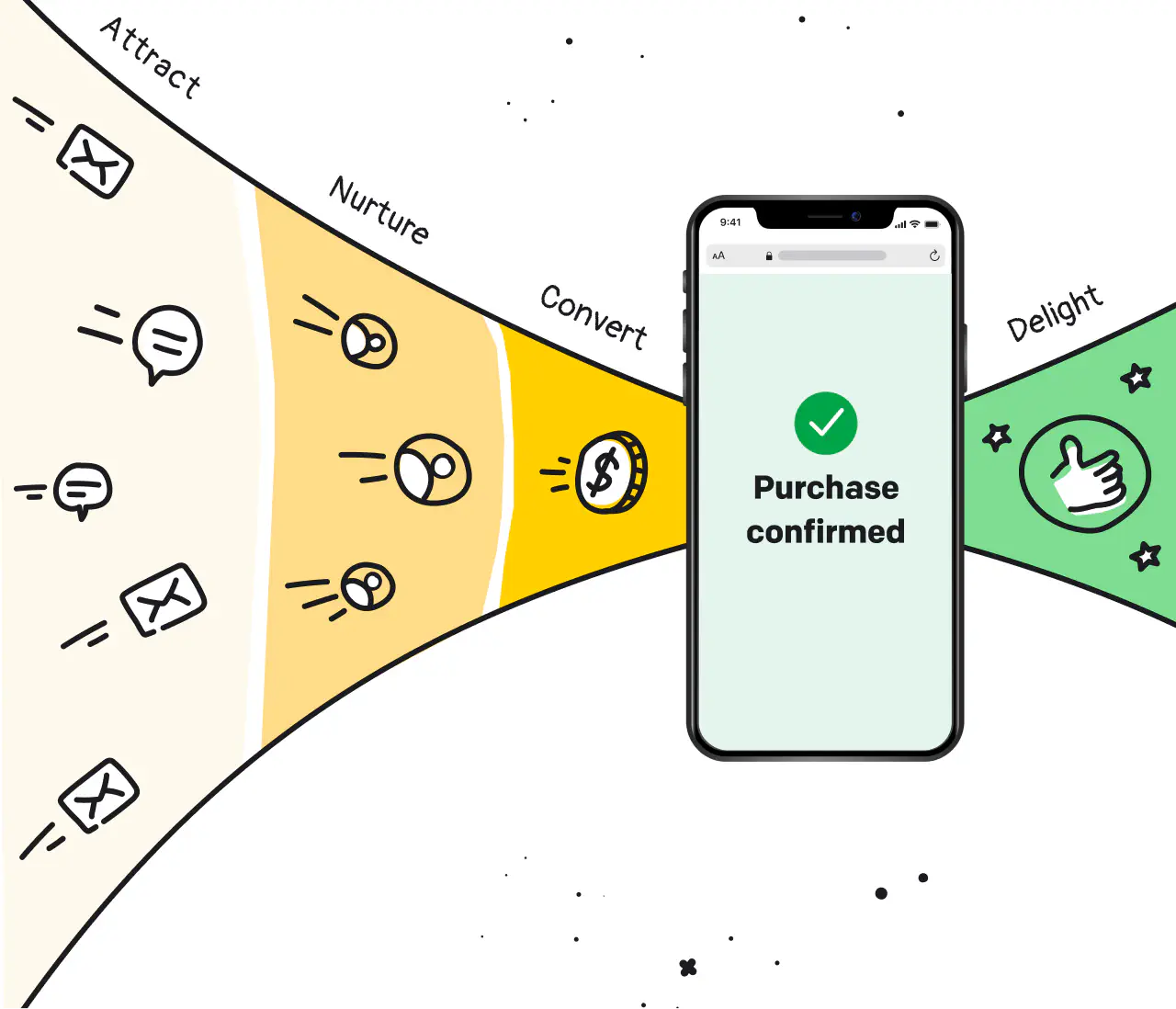
Improve your web conversion with digital communication tools, self-service & automation. Set up an efficient multi-channel pipeline that leads customers right to your company's digital doors.
Free 14-day trial No credit card required
Trusted by 37,000+ companies

An effective eCommerce factory needs proper digital tools. Luckily LiveChat has precisely what you need. Just like a multitool, it resolves many problems while taking only a little bit of space in your pocket.
Regardless if you like automation or a more human approach, LiveChat has a solution for you. For example, greetings messages - attract a lot of web users' attention by automatically popping up on customers' screens.
On the other hand, your agents can manually invite chosen prospects with custom notes, offering website visitors direct communication where it’s most beneficial.
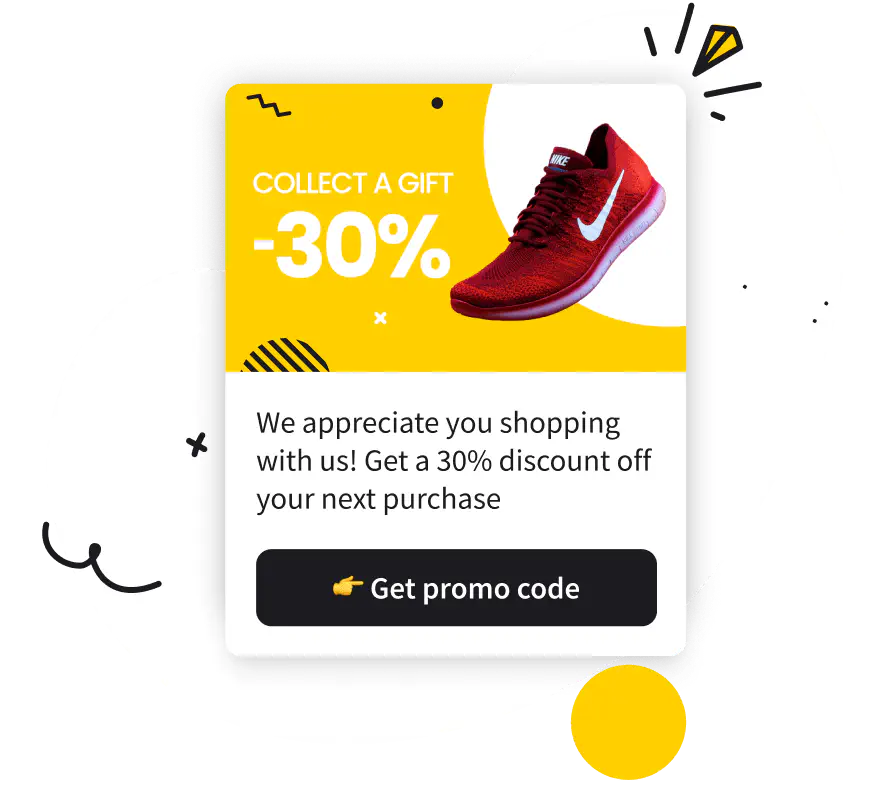
Host your valuable content on KnowledgeBase, a platform for publishing help center articles, FAQs, and self-service. Let your website texts enhance the top of the lead generation funnel by attracting online leads.
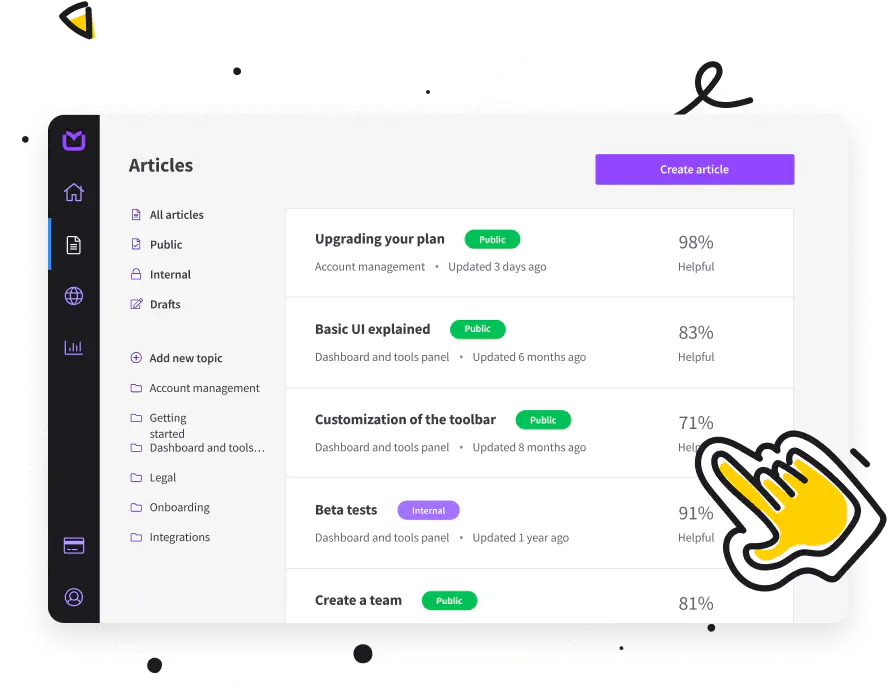
Are newsletters your bread and butter? Welcome a fresh stream of subscribers coming straight from chat leads. With our email marketing integrations. Get more email clicks thanks to marketing integrations, like Mailchimp or Ortto (Autopilot). Let customers subscribe to your campaigns seamlessly while talking to them.
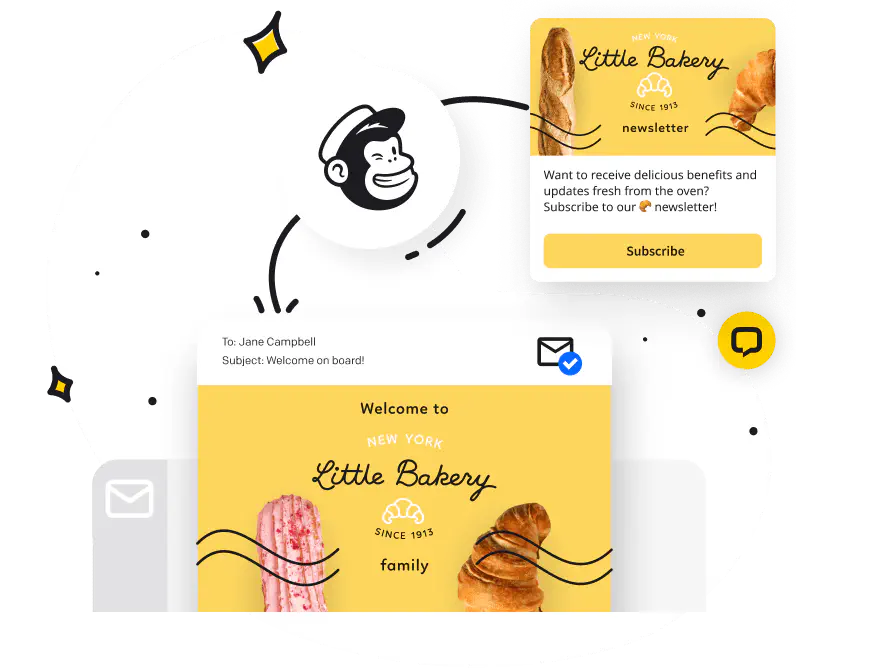
Keep up high levels of customer engagement with HelpDesk, a simple ticketing system that provides the right tools for the job. Save time with automated Workflows. Resolve multiple cases with bulk actions. Tag, categorize, and prioritize tasks with ease. Let your agents nurture customers with the personal approach they deserve, while business intelligence automation takes chores away.
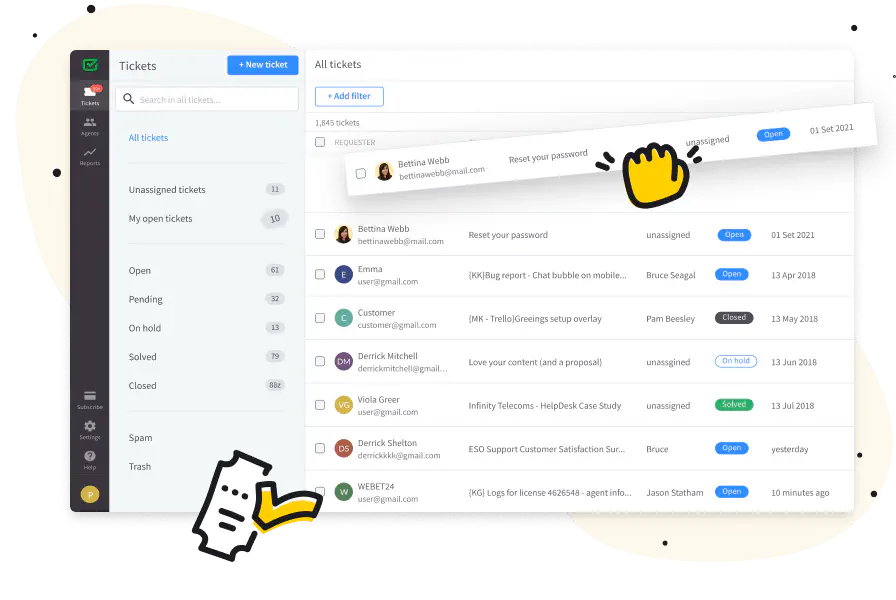
If you know your marketing well, you know that clear CTAs are what drives leads to purchase your goods. We know them, we love them. LiveChat Rich Messages and ChatBot Moments are proof of that.
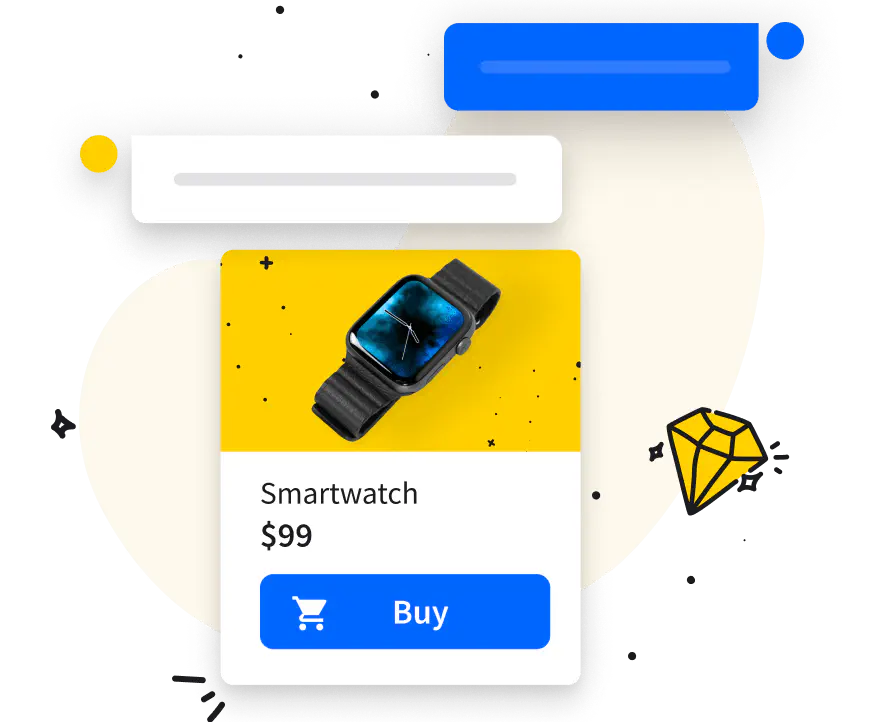
The way you treat people tells a lot about you and your company. Why wouldn’t you show customers respect with a nice-looking email, custom chat widget, or a tailored bot conversation? Qualify leads by showing effort and gaining their trust with beautifully designed messages.
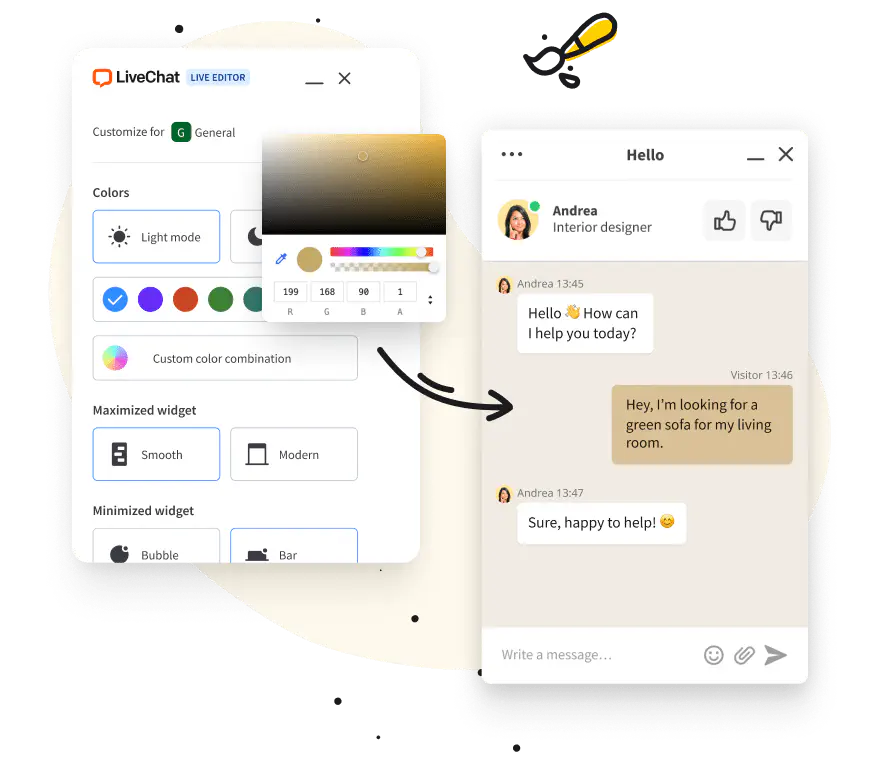
Is achieving 24/7 availability a struggle? Not on our watch! Reach the round the clock accessibility with automated bots, offline forms, or even asynchronous communication. Let your lead generation machine work nonstop while you sleep!
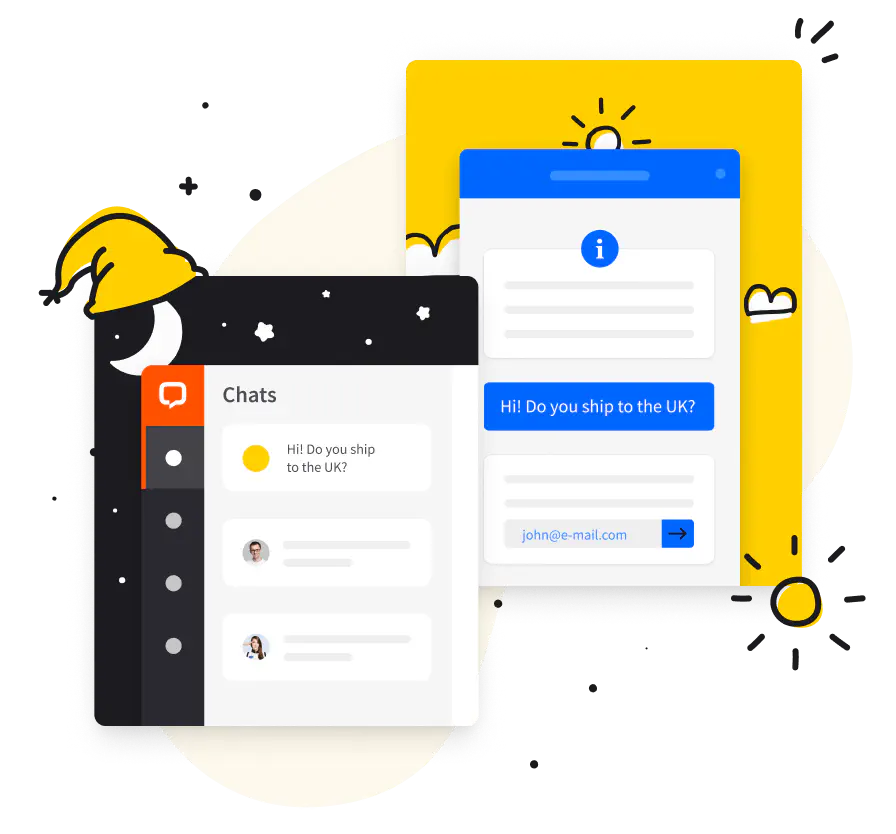
Integrate your CRM systems and analytics with LiveChat. Reach your conversion goals with ease. Whether you are measuring add clicks, checkouts, subscriptions, or any other business metric, LiveChat analytics will fit the bill. Our solution can be perfectly tailored to your web environment and ecommerce objectives.

Is your company communicating online? And your workplace is made of messengers, email boxes, CRMs, and other kinds of software? Consolidate the whole online space your company covers with a single app. Improve conversion with flawless LiveChat Marketplace integrations.
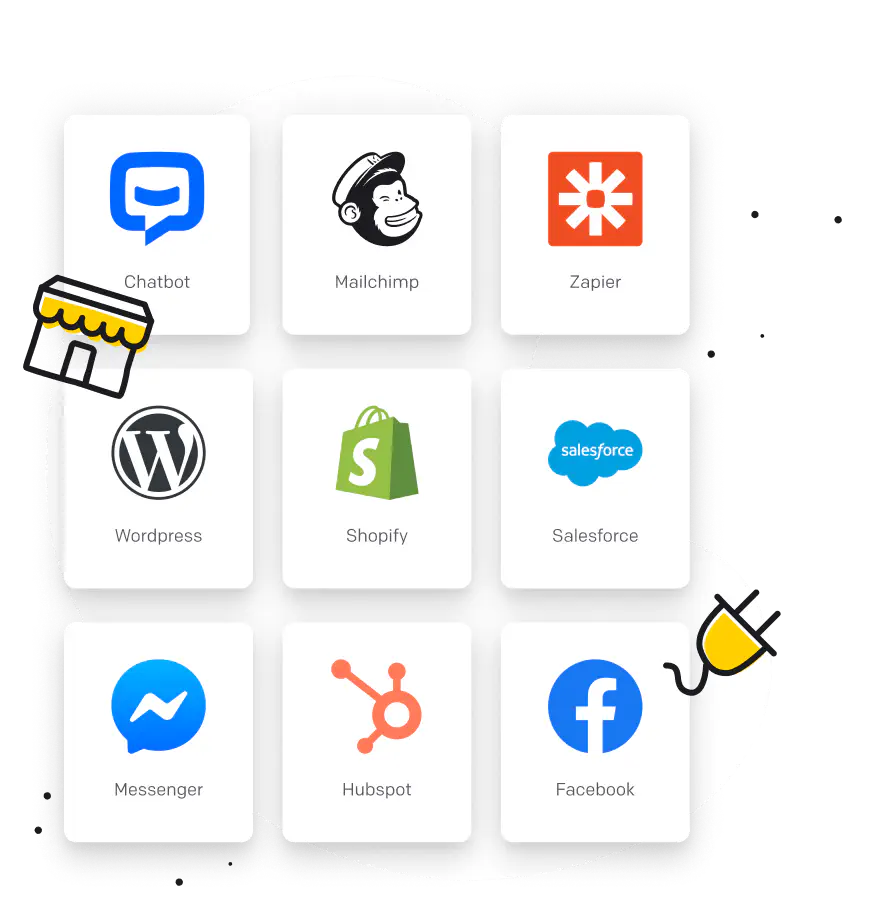
Is your sales team closing deals over a video call - taking it a step further to show customers the respect they deserve? We admire that! Start a session from any device from the LiveChat app. Present them with a face they can relate to your enterprise brand and close that deal.
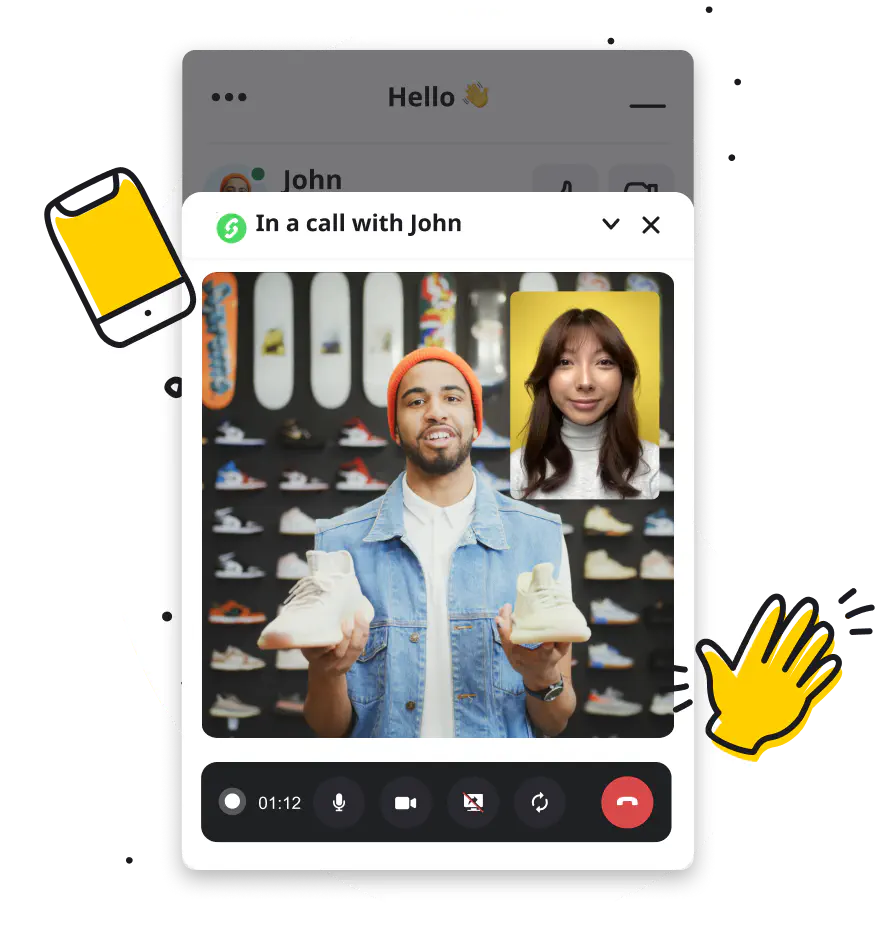
Appeal to your marketing leads by providing pre-and post-purchase premium support services. Our tools are developed, tested, and used by real-life support heroes so you can be sure that you get top-level gear to delight them 24/7.

Let your leads voice their feedback through customizable forms tailored to your website's lead generation funnel. Collect their reviews and comments, adapt to their needs, and win them by showing your commitment.
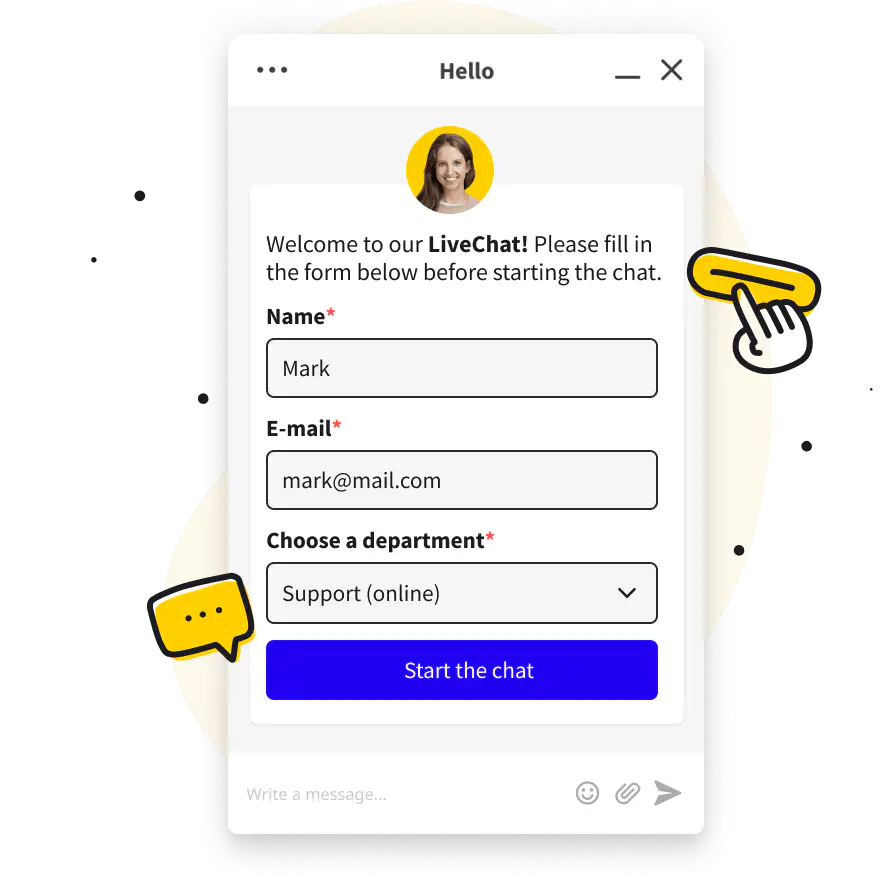
Social media channels are an irreplaceable part of the lead generation funnel. Our integrations let you manage all of them conveniently in one place. Respond to your followers from Facebook, WhatsApp Business, and Twitter directly from the LiveChat app.
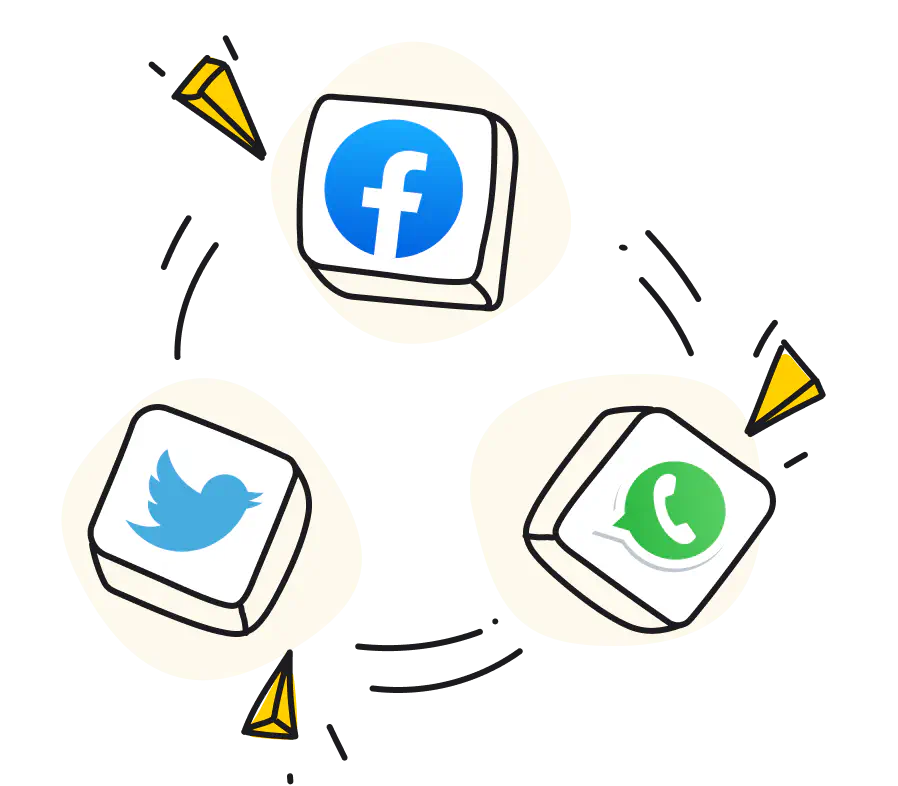
Free 14-day trial No credit card required
2,000 conversations with customers each week
Nju Mobile improves efficiency by implementing a number of customized greetings across the website. The strategic placement of the greetings allows them to provide aid in any situation and actively encourage eCommerce clients to place an order. Greetings also increase the number of chats the company receives. Currently, Nju Mobile agents have around 2,000 conversations with customers each week.
15‑20% boost overall product sales due to LiveChat interactions
PureVPN uses goals on their PWA to see how many visitors successfully concluded their checkout. Their model is built on page application stats: buyer behavior and cart data.
This data improves website usability, UX and helps with guiding users to sales during the checkout process.
Sales tracker feature proved to be handy in measuring the revenue generated from the chats. That’s how they know they were able to boost overall product sales by 15-20% due to LiveChat interactions.
94% customer satisfaction rate
VDS chatbot has an average response time of three seconds. This allows the business to operate 24/7 while providing super quick responses. Staffing a contact center or a brick-and-mortar location 24/7 would be quite a financial undertaking, but ChatBot gives the school that availability at a fraction of the cost. Many clients have shared their satisfaction with the quality and speed of service they received. The company is delighted with its 94% customer satisfaction rate.
Setting up a whole eCommerce lead generation funnel can be exhausting. We get that, and that’s why every tool and integration we offer is thoroughly described in Help Center articles. Moreover, each one has a dedicated support team with expert knowledge about their products.
These support heroes are here to save the day, available 24/7 to guide you on every step of the sale funnel.

Lead generation is process of identifying and cultivating potential customers in business. It involves attracting and converting potential customers (prospects) into leads, who might become paying customers. Effective online lead generation strategies involve using dedicated lead generation software and communication channels: business website, email, content marketing, affiliations, CRMs and marketplaces. The goal is to generate interest by attracting web users with goods or service offers and capturing (collecting) their contact information.
B2C (business-to-customer) lead generation is the process of identifying and cultivating potential individual customers, usually for a product or service through a variety of software tools and marketing channels. These may include strategies such as online ads and remarketing, social media advertising, email campaigns, and search engine optimization. B2C lead generation focuses on building brand awareness and loyalty among individual web users, ultimately driving revenue growth through increased customer acquisition.
Lead generation services work by using various techniques and strategies to identify and attract potential customers for a business. Basically, lead generation services can be divided to:
Leads identification: Identify target audience for a business's products. This can be done by analyzing customer data, conducting market research, and using dedicated software and tools.
Create marketing campaigns: Based on the target audience, the lead generation service will tailor specific actions to attract prospects. These include various types of marketing, such as direct outreach, email campaigns, online advertising, and others.
Capture leads: typically done through forms on website landing pages and mobile apps. Potential customers can enter their contact information (leave a lead) on an online form in exchange for something of value, such as a technical manual, e-book, PDF, whitepaper, subscription, or other.
Qualify leads: with leads captured, the lead generation service will qualify them to determine how likely they are to become customers. This may involve analyzing data on the lead's details such as demographics, behavior, and interests, as well as their engagement with the business's marketing campaigns.
Nurture leads: For leads that are not yet ready to become customers, the lead generation service will typically nurture them through a series of automated app notifications, emails, pushes and live chat messages. These messages are designed to keep the leads engaged and interested in the business's products or services which manifests in visiting brand websites and app interactions.
Deliver leads to the business: Finally, the lead generation service will deliver qualified leads to the business. This can be done in various ways, such as through a CRM system, email, or other means.
Overall, the goal of lead generation services is to help businesses attract prospects and convert them into paying customers. By using a combination of marketing strategies and lead capture and qualification techniques, these services can help businesses increase their revenue and grow their customer base.
Building a lead generation website involves creating a www page that is user-friendly (got proper UX & UI) and designed to attract and convert visitors to customers. This typically involves optimizing websites for product or service presentation and establishing a lead-collecting process. Usually, it's done with dedicated software integrations.
Common features of a lead generation website include:
- Clear call-to-action (CTA) on each page that encourage visitors to purchase or register.
- Lead capture form (signup or registration or SSO login) placed on landing pages and collecting visitor information such as name, email, and phone number.
- Product information, price and other details, including content such as blog articles or whitepapers that educates visitors.
- Testimonials or case studies to showcase the value of the product or service.
- Analytics tracking to monitor visitor behavior and optimize the website for conversions.
Overall, a lead generation website is an important online tool for businesses (especially ecommerces) to attract and convert potential customers into leads, increasing sales and revenue.
Livechat, help desk, chatbots, widgets and other lead generation software can work with any website type (including PWA & SPA websites) with easy integrations for eCommerces like Shopify, and WordPress websites.
There are a variety of lead generation tools and software available to help businesses capture, qualify, and convert leads. Some popular options include marketing automation platforms (like HubSpot or Mailchimp), web live chat widgets, lead capture and management tools, CRM, and other enterprise software and integrations.
In addition to these tools, various other resources are available to help with lead generation, including social media platforms, email marketing services, and content creation tools. The best lead generation tools and software for a particular business will depend on its specific needs and goals, so it's essential to evaluate options carefully and choose those that align best with your business strategy.
Real estate lead generation is critical to identifying potential home buyers and sellers through targeted marketing strategies. Creating a solid online presence is one of the most effective real estate lead generation strategies. This can be accomplished by developing a lead-collecting website, creating valuable content, and leveraging communication channels to reach a wider audience. Additionally, creating well-described sale offers, hosting open houses, offering free home valuations and networking with industry professionals can be effective tactics to attract potential clients.
Ultimately, the best lead generation strategy for real estate will depend on the specific needs and goals of the business, as well as the unique characteristics of the target audience. By implementing a lead generation plan that utilizes a mix of these tactics, real estate businesses can effectively generate more leads and convert them into valuable clients, leading to long-term success and growth.
The process of lead generation is crucial for businesses looking to expand their customer base and increase sales. It involves identifying and engaging potential customers with targeted marketing and dedicated outreach efforts. By leveraging proper communication channels, businesses can reach a wider audience and attract potential leads to their brand.
Once potential leads have been identified, the next step is to nurture those relationships through ongoing communication and engagement. This involves creating valuable content, sending personalized emails, and providing targeted offers to move potential customers further down the sales funnel. By doing so, businesses can increase the likelihood that potential leads will eventually convert into paying customers.
A basic lead generation setup typically involves the following steps:
1. Develop a website or app to sell online.
2. Identify your target audience or buyer persona.
3. Develop a compelling offer or incentive to entice potential customers to share their contact information and leave a lead.
4. Create a landing page with an online form to collect contact information from potential customers (prospects).
5. Drive user traffic to your landing page/app through various marketing channels.
6. Follow up with leads through email, phone, or other channels to nurture and convert them into paying customers.
Buying leads can be a quick way to increase the volume of potential customers for your business, but it comes with several risks.
First risk: purchased leads may not be high-quality, meaning they may not be interested in your product or service. Second, purchased leads may not have opted in to receive communications from your business, which can lead to complaints and damage to your brand's reputation. Third, purchased leads can be expensive, and the return on investment may not be worth the cost.
Instead of buying leads, businesses should focus on creating high-quality, engaging content that naturally attracts potential customers and generates leads organically.
B2B (business-to-business) lead generation refers to the process of identifying and attracting potential business and institutional customers for a product or service. This typically involves strategies such as targeted marketing efforts, account-based operations, targeted advertising, and social networking with industry professionals. B2B lead generation aims to establish stable, strong, long-lasting business partnerships. B2B lead generation goal is to increase revenue (ROI) growth through a tailored approach to customer acquisition.
Lead generation marketing is important for businesses because it helps to identify and attract potential customers for products or services. It's one of major mechanisms to drive online sales of goods and services. A company that develops a lead generation process gets more customers. It's usually done with websites and software that capture the interest of potential customers and nurture them through the sales funnel. Effective lead generation marketing strategies can help businesses grow their loyal customer base, establish brand awareness, and increase revenue.
Lead generation companies work by helping businesses find potential customers or clients. They typically use various marketing tactics and techniques to generate interest and gather information about potential leads. The information is then used to qualify and nurture the leads, with the goal of ultimately converting them into paying customers for the businesses they serve.
Lead generation and demand generation are two marketing strategies with distinct approaches and goals. Lead generation is the process of identifying and attracting potential customers and converting them into qualified leads. It involves using targeted messaging and personalized content to capture their interest and persuade them to take action.
Demand generation focuses on generating brand awareness and interest among potential customers who may not yet be ready to make a purchase. It aims to create a buzz around a brand and generate interest in the long term rather than simply focusing on immediate lead generation. Demand generation downturn is that its effectiveness is often poorly measurable.
In summary, while both lead generation and demand generation aim to attract potential customers, their approaches and goals differ significantly. Lead generation focuses on converting potential customers into qualified leads, while demand generation focuses on creating brand awareness and generating interest in the long term.
Businesses can use several effective lead-generation strategies to attract and convert potential customers. These include content marketing, search engine optimization (SEO), paid advertising, social media marketing, email marketing, and event marketing. The best lead generation strategies for a particular business will depend on its target audience, industry, and marketing goals, so it's important to experiment with different tactics and measure their success to determine the most effective approach.
In addition, it's important to continuously optimize and refine lead generation strategies based on customer feedback (from surveys and reviews) and data analysis. By implementing a comprehensive lead generation strategy that incorporates multiple channels and tactics, businesses can improve their chances of success and drive growth.
Lead generation in sales refers to identifying, targeting, and nurturing potential customers who have shown interest in a product or service. By nurturing those relationships through targeted marketing and outreach efforts sales dep can extend its contact base. Effective lead generation tactics include a constant improvement on e-commerce product cards, email marketing, affiliate programs, and referral marketing.
To create an effective lead generation strategy, businesses must clearly understand their audience and the communication channels they use to engage with them. By providing valuable content and personalized offers, businesses can move potential customers further down the sales funnel and increase the likelihood that they will convert into paying customers. Remember about effective customer service, which helps transfer leads to sales and can support prospects and customers with more complex issues.
Lead generation tactics are diverse and can be implemented through various communication channels, including digital and traditional marketing. Some popular lead generation examples include:
- installing on a website software like a live chat widget app - to enhance prospect-to-brand communication
- improve sale procedures - notification, follow-ups, addressing individual queries, etc.
- affiliate programs,
- content marketing (such as webinars, blog posts, videos, and e-books),
- referral programs, or paid advertising through platforms like Google Ads and Facebook Ads,
- hosting in-person events or conferences,
- free trials or demos of products or services.
By leveraging these tactics, businesses can attract potential customers, capture their interest, and move them down the sales funnel toward conversion.
There are several types of leads that businesses can generate, including source of leads:
- Marketing Qualified Leads (MQLs): These are leads that have shown interest in your business or product through marketing efforts, such as downloading a whitepaper or subscribing to a newsletter.
- Sales Qualified Leads (SQLs): Leads that have been vetted by the sales team and are deemed ready for direct contact and follow-up.
- Product Qualified Leads (PQLs): Leads that have used your product and demonstrated an interest in purchasing or upgrading.
- Service Qualified Leads (SQLs): Leads that have expressed an interest in your services, such as consulting or implementation services.
Another popular classification is by interest in converting:
- Hot leads: ready to buy product or service,
- Warm or Fresh leads: newly acquired or somewhat interested in buying,
- Cold Leads: with no to little interest and/or information about the offer.
Lead generation can be particularly beneficial for small businesses that have limited resources for marketing and advertising. By generating leads, small businesses can:
- Expand their customer base by reaching a wider audience and attracting new customers who are interested in their products or services.
- Increase sales by nurturing and converting leads into paying customers; small companies can increase their revenue and grow their business.
- Build brand awareness with engaging content and marketing campaigns, small brands can build awareness and get themselves visible players in their industry.
- Improve customer relationships by following up with leads, providing personalized communication, and building loyalty over time.